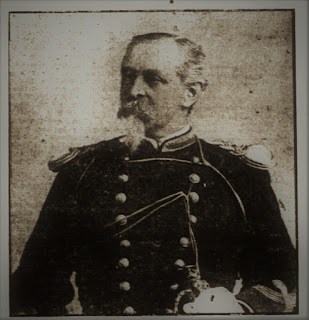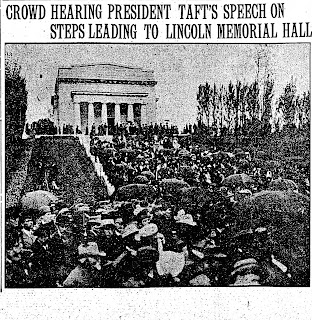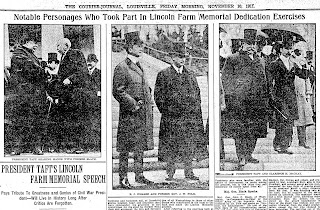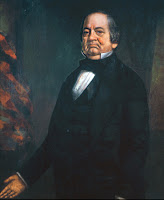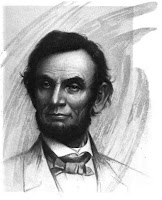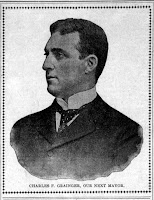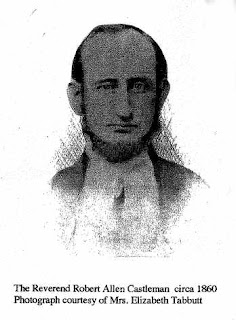November 8, 1913
William R. Goodwin, a member of the
American Saddle Horse Breeders' Association, and editor of the
Breeder's Gazette came from Chicago to attend the unveiling.
 |
| John Breckinridge Castleman on his horse Carolina |
WILLIAM R. GOODWIN'S TRIBUTE.
THE CASTLEMAN EQUESTRIAN STATUE.
Profound indeed is the esteem which led a city and a state to erect a statue of one of its distinguished citizens while he yet dwelt among men. Such supreme honors are wontedly reserved for the dead. Singularly appropriate is this precedent-breaking man. The unselfish, lavish devotion of General John B. Castleman to the interests of his state and country are written on the imperishable tablets of the hearts of his people. Public service has ever been the animating spirit of his career. Never has a man devoted more of his time and talent, unsparingly, intelligently and effectively, to the service of his city and state than General Castleman, and the results of his labors bless the present and future generations. Had he but served his own interests with half the fidelity with which he has served his fellow citizens, he would have been numbered among the financial captains of the South. The bronze statue, on its eternal granite base, commanding the entrance to beautiful Cherokee Park in Louisville, dedicated in the songs of the school children, the concerted sounds of the players on many instruments, the fanfare of military trumpets, the eulogies of state and city officials, and the plaudits of his fellow citizens, proved that John B. Castleman chose to serve the people, not Mammon.
Flowers at the funeral are so prescribed by conventionality that appreciative words while yet in the flesh seems fairly strange. Small wonder it is that some out of touch with the man and his work marveled that so distinguished an honor should be done him while yet he walked the earth. They had but to feel the thrill of the dedication atmosphere to understand it was an outpouring of the appreciation and love of a people loyally and intelligently served. His most familiar appearance in Louisville, either at the head of the Louisville Legion or pursuant of his labors as president of the Board of Park Commissioners, was on the back of a five-gaited horse. The model selected from a competition to which numerous sculptors contributed was designed by R. Hinton Perry of New York and the statue was erected at a cost of $15,000 by popular subscription from city, state and other commonwealths to General Castleman
"as a man, a citizen, a soldier and a true friend." It may be seriously doubted if ere a more life-like presentation of man and horse in bronze has ever been achieved. With infinite pains the artist labored with his equine model, and the sculptor's art has finally been able to ask of horsemen unqualified approval of a bronze presentment of the noblest of man's animate aids. The statue breathes the form, pose and life of man and mare.
General Castleman is known to the live stock world as the foremost advocate of the most beautiful creation of the breeder's art — the American saddle horse.
For nearly a quarter of a century as president he has guided the destinies of the American Saddle Horse Breeders' Association, inviting and compelling the attention of the lovers of the pleasure horse to the matchless beauty, finish and service of the saddle horse as developed under the auspices of the association, and has lived to see the complete triumph of the type in America, measured by the prominence, intelligence and wealth of its patrons. Of his civic and military services this journal does not treat, but promising as the fundamental fact of his life, the animating motive of his actions, his high sense of public duty, it can only be said that the Honorable Edward J. McDermott, lieutenant-governor of Kentucky, sketched with altogether adequate eloquence the career of Gen. Castleman with which the people of his state have been familiar since he entered the Confederate service as a mere youth and returned home from the Spanish War with a general's commission, to receive this unprecedented honor from his people in the seventy- second year of his age.
His services to the state in times of riot and profound political disturbance, when his diplomacy and decision wrought for peace and tranquility, were fittingly set forth, as were also his courage and his courtliness "A gentleman of the old school," all delighted to term him — rare example in these latter days which possess not the environment which makes for their development.
(source: 'Active Service', John B. Castleman)


